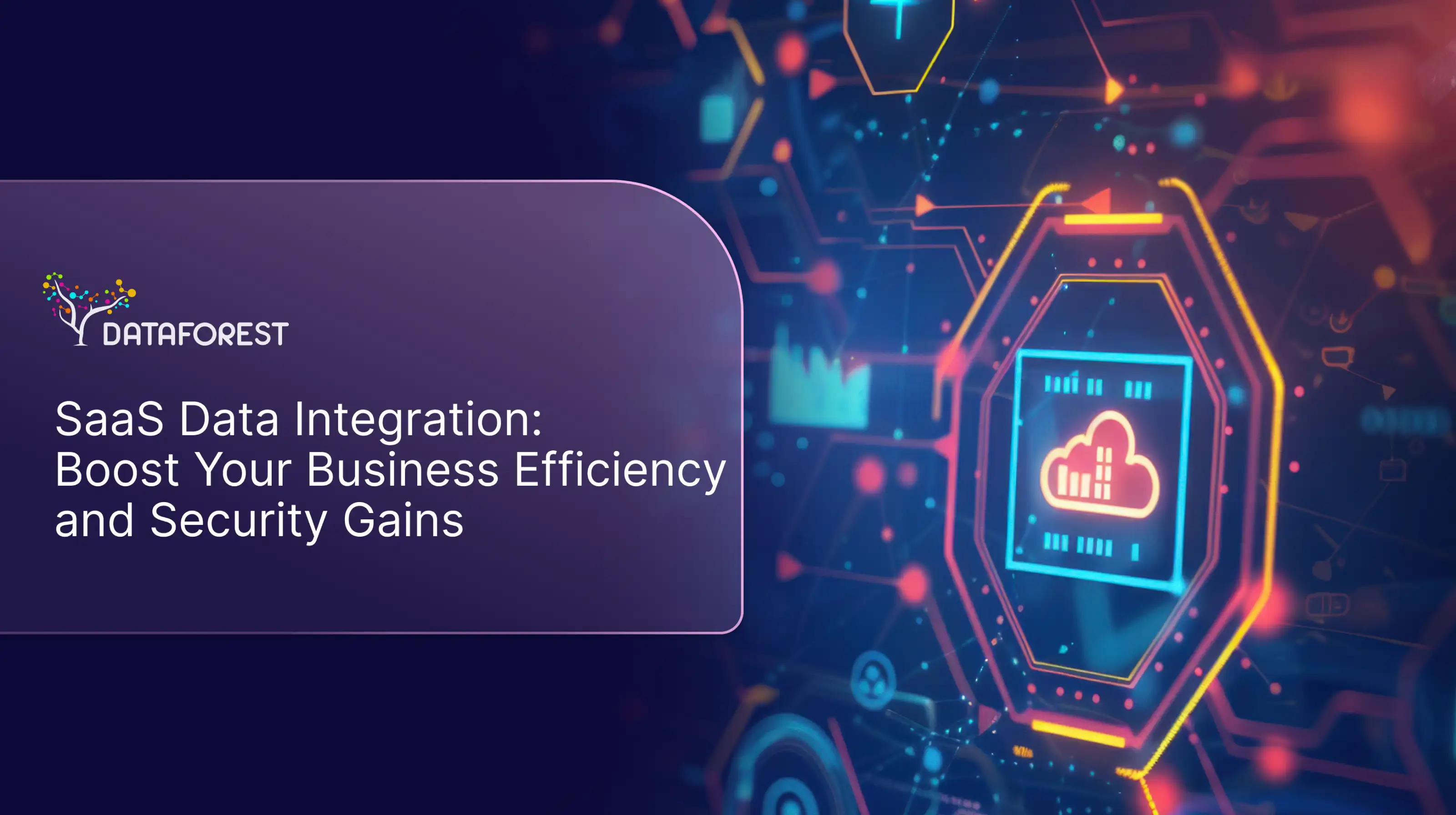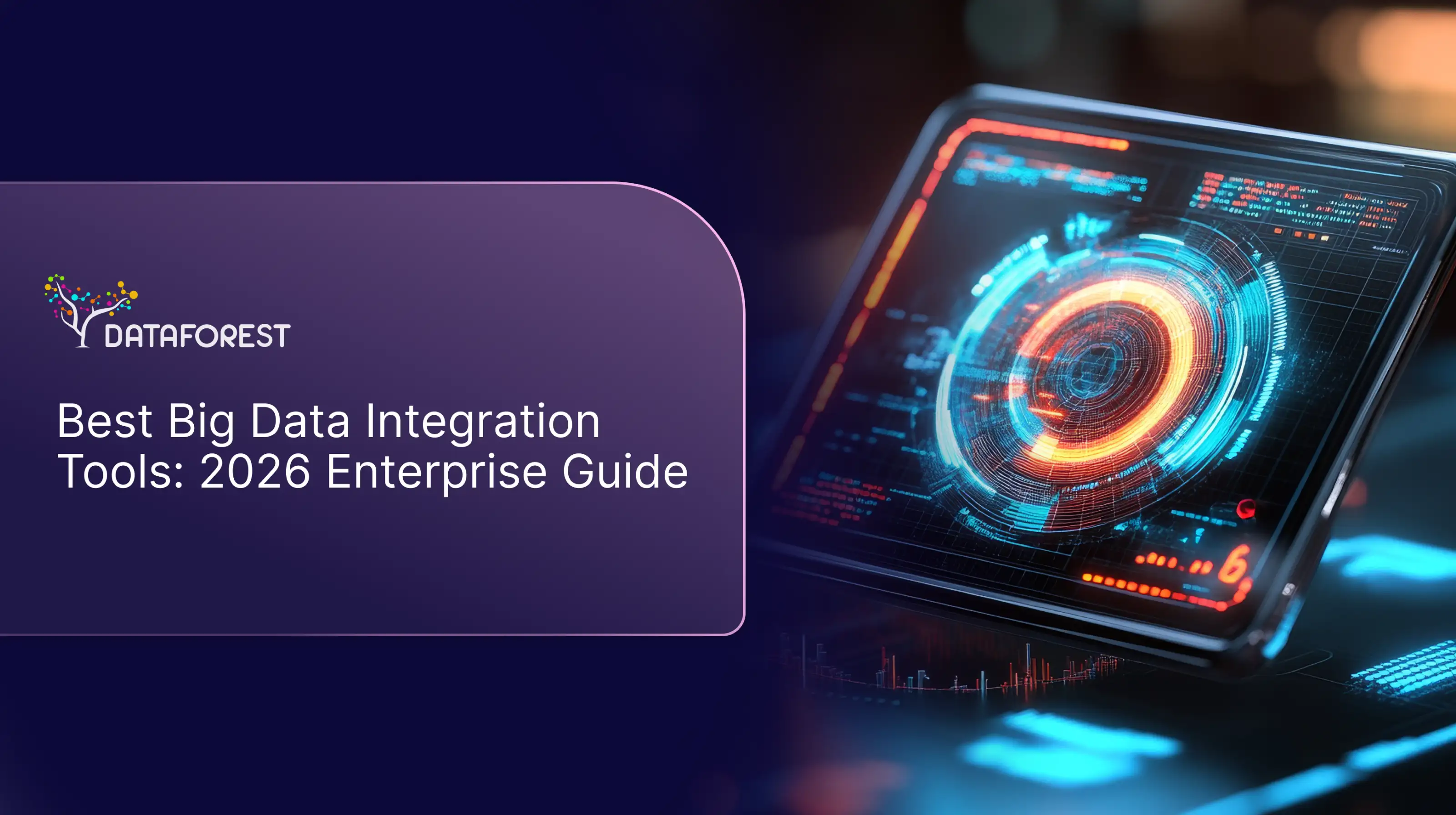A patient has a rare, undiagnosed genetic disorder. Traditional diagnostics were unable to pinpoint the cause of their severe symptoms. However, an AI-powered diagnostic tool trained on vast genetic data analyzes the patient's genome. It quickly identifies a unique genetic mutation that matches a previously extremely rare condition. Armed with this information, doctors provide targeted treatment, potentially saving the patient's life. While this is a fictional example, similar scenarios are becoming increasingly possible as AI technology advances. AI's ability to process and analyze complex data at unprecedented speeds leads to breakthroughs in diagnosis and treatment. Book a call, get advice from DATAFOREST, and move in the right direction.
.webp)
Improved Patient Outcomes with AI In Pharmaceutical Research
Artificial intelligence (AI) is a field of computer science that creates intelligent agents, which are systems that can reason, learn, and act autonomously. AI is the development of computer systems that perform tasks that typically require human intelligence, such as understanding natural language, recognizing patterns, and solving problems.
Accelerated Drug Discovery: AI analyzes biological big data to find potential drug targets and design new molecules more efficiently, reducing the time and cost of drug development.
Personalized Medicine: AI studies patient data, including genetic information and medical history, to tailor treatment plans to individual patients. It improves treatment outcomes and reduces side effects.
Enhanced Clinical Trials: AI optimizes clinical trial design, improves patient recruitment, and reads trial data more effectively for more efficient and informative clinical trials.
Supply Chain Management: AI reshapes pharmaceutical supply chains by predicting demand, improving inventory management, and ensuring product quality.
Drug Repurposing: AI identifies new therapeutic uses for existing drugs, accelerating the development processes of treatments for rare diseases and unmet medical needs.
The Drug Development Journey
First, you must find the specific part of the disease that is causing the trouble. This could be a protein, a gene, or a whole cell. Once you've got your target, you start looking for a molecule that can hit this target and stop the disease. Before you try it on humans, you test it on animals. If the treasure works well on animals, it's time for human trials. When you've gathered enough data, submit it to the regulatory authorities. If they approve, your drug can be used to help people.
AI: The Pharmaceutical Industry's Visionary
If you're a pharmaceutical company trying to predict the future, you want to know which drugs will be the next big hits, when to launch new products, and how to navigate a constantly changing market. AI in the pharmaceutical industry sifts through mountains of information, from patient records to research papers, and finds patterns humans might miss. With the puzzle pieces in place, AI in the pharmaceutical industry starts making predictions:
- How many pills of a new medication will people need next year?
- Will there be a surge in demand for certain types of drugs?
- Who are the biggest players in the market, and what are their strategies?
AI in the pharmaceutical industry forecasts new drug sales, helping allocate resources more efficiently. By analyzing patient data, AI identifies individuals who are at high risk for certain diseases. AI in the pharmaceutical industry designs more efficient clinical trials, reducing time and costs.
AI in The Pharmaceutical Industry – The Virtual Drug Hunter
You're a pharmaceutical scientist searching for a needle in a haystack, but the haystack is the entire universe. That's the challenge of drug discovery. There are countless molecules out there, and only a tiny fraction could potentially be the next blockbuster drug. AI in the pharmaceutical industry is really a virtual drug hunter, scouring the universe of molecules for potential hits.
Create a Database: First, scientists create a massive database of molecules. It's a digital library of every possible drug candidate.
Set the Target: Next, they identify the target, the specific molecule or protein in the body with which the drug needs to interact.
Run the Simulations: AI algorithms then virtually test each molecule in the database against the target. It's a high-speed dating service for molecules, but they look for a perfect fit instead of compatibility.
Identify Hits: The AI in pharmaceutical marketing identifies molecules that show promise. These are the potential drug candidates that need further development testing.
It screens millions of molecules in a matter of days, a task that would take humans years. AI in the pharmaceutical sector prioritizes the most promising molecules, saving time and resources. It also predicts the properties of molecules with high accuracy, reducing the risk of failure in later stages of development.
AI in the pharmaceutical market has helped identify new antibiotic candidates that could combat antibiotic resistance and has been used to design drugs that target specific mutations in cancer cells.
AI in The Pharmaceutical Industry – The Molecular Architect
In drug development, scientists face a challenge: designing molecules that are both effective and safe. AI in the pharmaceutical industry helps design drugs with precision and efficiency.
- Clearly specify the desired properties of the molecule (e.g., potency, solubility, safety).
- AI is used in pharmaceutical algorithms to generate many molecule structures.
- Assess each molecule using AI in the pharmaceutical models based on its predicted properties.
- Iteratively modify the molecules to improve their properties based on the evaluation results.
- Choose the molecule that best meets the desired criteria for further development.
AI in the pharmaceutical industry has helped design more effective drugs at lower doses. It also has been used to design drugs that are more easily absorbed by the body.
Personalized Medicine and AI in the Pharmaceutical Industry
Personalized medicine is a healthcare approach tailoring treatments to patients' needs. This is achieved by studying a patient's unique genetic makeup, medical history, and lifestyle factors to determine the most effective treatment course.
AI in the pharmaceutical market processes large amounts of patient data, including genetic information, medical records, and lifestyle factors. It finds patterns and correlations within this data that may not be apparent to humans. AI in the pharmaceutical industry predicts how different treatments may affect individual patients based on their unique characteristics. It helps healthcare providers develop personalized treatment plans that are more likely to be effective and have fewer side effects.
Precision oncology AI in the pharmaceutical industry helps identify specific genetic mutations in cancer patients and recommend targeted therapies. It shows new uses for existing drugs based on individual patient characteristics.
Genomics: The Blueprint of AI Life-Saving
Imagine your body is a complex machine, and each cell is a tiny factory. The instructions for how these factories should operate are written in a language called DNA. Genomics is the study of this language. It generates big data, like a giant library filled with books written in code that humans can't decipher. AI in pharmaceutical research reads and understands this complex language.
AI in the pharmaceutical industry analyzes genomic data, identifying patterns and variations that might be linked to diseases or drug responses. It discovers new drug targets by studying the genetic differences between healthy and diseased individuals. By understanding a patient's unique genetic makeup, AI in the pharmaceutical sector tailors treatments to their specific needs. And it also predicts a person's risk of developing diseases based on their genetic information.
In practice, AI in the pharmaceutical industry finds specific genetic mutations in cancer patients and recommends targeted therapies. It diagnoses rare genetic disorders by analyzing a patient's genome.
More Informed Decisions About Patient Care
Is it true that dentists ask everyone, "What is your reaction to pain medication?" Imagine you're a doctor trying to predict how a patient will respond to a new drug. It's like trying to guess the weather without a forecast—a risky gamble. AI in the pharmaceutical industry peers into the future and predicts how a drug will interact with a patient's body.
AI pharmaceutical tools read a patient's genetic makeup, medical history, and lifestyle factors. The AI looks for patterns in this data, comparing it to the experiences of other patients. Based on these patterns, the pharmaceutical industry's AI software for business intelligence predicts how the patient might respond to a drug.
AI in the pharmaceutical industry names patients who are more likely to develop resistance to certain drugs and adjusts treatment plans based on a patient's response to a drug.
The Personal Pharmacist
Imagine you're a patient with a chronic condition who has tried multiple treatments, but none seem to work quite right. However, AI technology in the pharmaceutical industry studies your unique situation and recommends the best treatment for you.
AI tools in the pharmaceutical industry collect information about your medical history, genetic makeup, and lifestyle. It compares your profile to a vast database of patient information. Based on this analysis, the AI in the pharmaceutical industry recommends specific treatments or dosages that are likely to be effective for you. It determines the best dose of a medication for a particular patient and suggests alternative treatments for patients who are not responding to their current medication.
Making Pills Perfect: Improving AI Pharma Production
A pill factory is a giant candy factory, but instead of gummy bears, it makes medicine. Every pill needs to be perfect, or people could get sick. Even a tiny mistake can have big consequences. That's why there are strict rules and many checks to ensure pills are safe.
Pharma companies use robots to fill bottles. Robots are faster and make fewer mistakes than humans. They try to cut out waste and do things more efficiently. It's like cleaning up your room and throwing away stuff you don't need. They're always looking for ways to do things better. It's like a never-ending game of "Can you do it faster, cheaper, and better?"
To make sure pills are perfect, they look at pills closely to make sure there are no problems, take some pills, and test them to see if they're okay. If there's a problem, they find out where it happened.
AI in the Pharmaceutical Process: The Robot Pharmacist
Imagine a bustling pharmaceutical factory filled with workers carefully assembling pills. Now, picture robots do the same tasks faster, more accurately, and without getting tired. That's the power of automation, driven by AI in the pharmaceutical industry.
Robotic arms fill bottles, seal packages, and label products. AI systems control these robots, providing them with instructions and monitoring their performance. AI analyzes data from the production process to identify bottlenecks, improve efficiency, and prevent errors.
Automation increases production speed and reduces waste. Robots perform tasks with greater precision, reducing the risk of errors. By automating hazardous tasks, AI in the pharmaceutical sector improves workplace safety.
AI-powered systems inspect pills for defects, ensuring that only high-quality products reach the market. They also predict when equipment is likely to fail, allowing for preventive maintenance and minimizing downtime.
AI in the Pharmaceutical Monitoring: The Quality Control Watchdog
AI-powered machine vision systems inspect pills for defects, such as cracks, discoloration, or foreign particles.
AI in the pharmaceutical industry reads data from the production process, identifying patterns that may indicate quality issues. It also forecasts when equipment is likely to fail, warning you about potential problems before they happen.
In such a way, AI in the pharmaceutical sector finds and prevents defects, ensuring that only high-quality AI products reach the market. By detecting defects early, AI reduces waste and improves overall efficiency. It also prevents the release of defective products that could harm patients.
AI in the pharmaceutical world monitors production processes in real time for immediate intervention if any issues arise.
Advantages and Challenges of the AI in the Pharmaceutical Sector
The simultaneous existence of advantages and challenges in using AI in the pharmaceutical sector reflects the complex nature of technological innovation. It highlights the need for a careful approach to implementing AI in the pharmaceutical industry.
Book a call if you want to always be on the cutting edge of technology.
10 Benefits of Using AI in the Pharmaceutical Sector
- AI in the pharmaceutical sector speeds up the drug discovery process by identifying potential drug targets, designing new molecules, and predicting their properties.
- AI algorithms analyze vast datasets to identify novel drug targets that were previously overlooked.
- AI in the pharmaceutical industry optimizes the properties of existing compounds, leading to more effective and safer drugs.
- It enables personalized medicine by studying patient data to develop tailored treatment plans.
- AI in the pharmaceutical market streamlines clinical trials with AI by optimizing patient recruitment, reading data, and identifying potential risks.
- AI helps pharmaceutical companies comply with complex regulatory requirements by automating compliance checks and risk assessments.
- AI in the pharmaceutical sector reduces costs by streamlining processes and improving efficiency.
- By accelerating drug discovery and enabling personalized medicine, AI improves patient outcomes.
- AI in the pharmaceutical industry optimizes supply chains by improving inventory management, demand forecasting, and risk mitigation.
- It also fosters innovation by enabling new approaches to drug discovery and development.
Ethical and Legal Issues in the AI Pharmaceutical Research
While promising, AI integration into the pharmaceutical sector raises significant ethical and legal concerns.
One primary concern is the potential for AI to introduce errors or biases into drug development or treatment recommendations. If a pharmaceutical AI algorithm is trained on biased data, it may produce biased results, leading to incorrect diagnoses or inappropriate treatments. The black-box nature of many AI algorithms makes it difficult to understand and explain their decision-making processes.
AI systems often rely on large patient data datasets, raising concerns about data privacy and security. There is a risk of unauthorized access to sensitive patient information, which can lead to identity theft, discrimination, or other harm.
AI technology in the pharmaceutical industry can potentially exacerbate existing health disparities. If AI systems are not developed and trained with diverse datasets, they may not perform equally well for different populations. For example, an AI algorithm trained primarily on data from white populations may not be as effective in diagnosing or treating diseases in people of color.
Determining liability in AI cases involving AI-driven medical devices or software is complex. If an AI in the pharmaceutical industry causes harm, it may be difficult to establish who is responsible—the developer, the manufacturer, or the healthcare provider.
The use of AI in the pharmaceutical sector must comply with existing regulations, such as those governing AI drug development, medical devices, and data privacy. Ensuring that AI systems meet these regulatory requirements is challenging.
The development of AI models requires investment and intellectual property. Protecting these rights while promoting innovation is a delicate balancing act.
Future Of AI in the Pharmaceutical Industry
AI-generated drugs: Gen AI will create new drugs from scratch.
Personalized medicine: AI in the pharmaceutical sector will tailor treatments to each patient.
AI-powered clinical trials: AI can speed up trials, find suitable patients, and analyze data faster.
Smart supply chains: AI in the pharmaceutical industry will optimize everything from inventory to transportation.
Ethical AI: It's important to use AI responsibly. We need to focus on privacy, fairness, and transparency.
Drug repurposing: AI in the pharmaceutical market finds new uses for old drugs, saving time and money.
AI for drug safety: It monitors drugs for side effects, keeping patients safe.

Pharma Needs a Tech Partner for AI
DATAFOREST tech providers are AI experts and navigate the complex world of AI to choose the right tools. We have the hardware, software, and data centers to make AI in the pharmaceutical industry work. No need to build everything from scratch. We tailor AI solutions to your specific needs, integrating them with your existing systems. Our team will be there to help you every step of the way, from implementation to maintenance. We’re always on top of the latest AI trends, giving you equal access to the newest tools and techniques. Please complete the form to avoid pitfalls and ensure a successful AI in the pharmaceutical market project.
FAQ
What types of AI in the pharmaceutical market are used in medicine?
AI is used in various ways in the pharmaceutical market. AI algorithms analyze vast datasets to identify potential drug targets and design new molecules. AI reads patient data to develop tailored treatment plans based on individual genetic makeup and medical history. It also streamlines clinical trials by optimizing patient recruitment, analyzing data, and identifying potential safety risks.
Will AI in the pharmaceutical industry replace pharmacists?
AI in the pharmaceutical sector is unlikely to replace pharmacists entirely in the foreseeable future. While AI can automate certain tasks, pharmacists' expertise in patient care, medication management, and counseling will remain invaluable. AI can augment pharmacists' capabilities, enabling them to focus on more complex and patient-centric tasks.
What are the limitations of AI in the pharmaceutical sector?
AI in the pharmaceutical sector faces limitations such as: (1) AI relies on high-quality and abundant data, which can be challenging to obtain, especially for rare diseases; (2) many AI algorithms are complex and difficult to understand, making it challenging to explain their decision-making processes; (3) AI raises ethical concerns related to data privacy, bias, and accountability, which need to be carefully addressed.
How big is the pharma AI market?
The pharma AI market is rapidly growing, driven by advancements in technology and AI, increasing demand for efficient drug discovery and development. According to recent estimates, the global pharma AI in the pharmaceutical market size was valued at over $3 billion in 2024 and is expected to reach $18 billion by 2029, growing at a CAGR of 42.68%. This significant growth reflects the potential of AI to change the pharmaceutical industry.
Describe the future use of AI in the pharmaceutical industry.
AI is poised to be pivotal in the pharmaceutical industry's future, driving innovation and improving patient outcomes. Generative AI will generate novel drug candidates, accelerating drug discovery and development. AI-powered drug repurposing will help identify new uses for existing drugs, expanding treatment options for various diseases. AI-enabled personalized medicine involves developing personalized treatment plans based on individual patient characteristics.



.webp)





.svg)
.webp)















